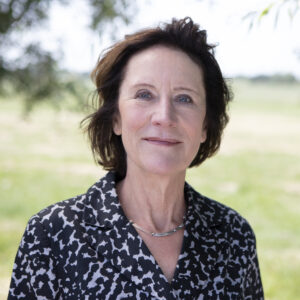Klik hier voor een video overzicht via Google (opent in nieuw tab)
Klik hier voor een lijst van podcasts waaraan Louise meewerkte (opent in nieuw tab)
Klik hier voor Louise in kranten of tijdschriften (opent in nieuw tab)

Louise Vet is former-director of NIOO-KNAW (1999-2019) and emeritus professor in Evolutionary Ecology at Wageningen University. She is a biologist with a broad interest in ecology and evolution of multitrophic interactions. Her research involves chemical, behavioural and molecular ecology of plants and insects in a community context, delivering basic knowledge for the strategic development of sustainable agro-ecosystems that are primarily based on the prevention of pests and diseases (life-support function of biodiversity). She is an elected member of the Royal Netherlands Academy of Arts and Sciences.
Vet was awarded several international prizes for her research (e.g. British Rank Prize for Nutrition) and serves on a diversity of national and international boards and committees. In addition to her professional interest in high quality ecological scientific research she has a special interest in communicating the importance of ecology to the general public (lectures, columns, media). Her outreach focuses on achieving a positive interaction between ecology and economy. Practice what you preach: she was the driving force behind the new NIOO building, the most sustainable laboratory/office complex in the Netherlands (www.nioo.knaw.nl/en/building), based on Cradle to cradle/Circle Economy principles, for which she received the 2012 Golden Pyramid state prize for excellence in commissioning work in architecture. Linked to these outreach activities Vet stimulates public-private partnerships to encourage new eco-technological developments.
Presently, in addition to the many other boards and committees that she serves on, she is chairing a broad societal coalition of scientists, nature organisations, agro-food chain, farmers, retail, banks that is working towards a large national plan to bend the curve of biodiversity decline (Deltaplan Biodiversiteitsherstel).
In December 2017 she was awarded the highest honour of the British Ecological Society. This Honorary Membership recognises exceptional contributions at international level to the generation, communication and promotion of ecological knowledge and solutions.
In 2018 she was elected number 1 in the Sustainable 100, the annual list of the Netherlands’ “greenest thinkers and doers”.
Upon her step-down as director of NIOO on October 31, 2019 she received the distinction of Knight in the Order of the Lion of the Netherlands, one of the highest royal decorations.
De weg naar herstel van biodiversiteit in Nederland loopt via de landbouw. Louise Vet over systeemdenken en kantelpunten, het belang van variatie en hoe de natuur nog veel vernuftiger in elkaar steekt dan we dachten. “We moeten van ik naar wij – en dat wij is dan zo breed dat we daar ook planten en dieren onder verstaan.” Lees hier …
Veel mensen willen graag een strak gemaaid gazon, maar de tuin van Louise Vet ligt er heel anders bij. Vet, bioloog en emeritus hoogleraar ecologie laat alle planten onbekommerd groeien rond haar huis, ook het onkruid. door: Tom Reijner Vet wiedt geen onkruid, want daar komen allerlei beestjes op af die heel erg belangrijk zijn voor de onder druk staande …
Hoogleraar ecologie Louise Vet vindt dat we op een andere manier met elkaar over verduurzaming zouden moeten praten. Niet met een vingertje, maar over oplossingen.“Niemand wil onderdeel zijn van het probleem, maar wél van de oplossing.”
Tijdens de (online) werkbijeenkomst van Het Groene Brein op 23 april 2020, sprak Louise Vet een column uit over het werk van wetenschappers met een duurzame missie in tijden van corona.
In Nederlandse huizen staan circa 65.000 pelletkachels; zo’n 44.000 met subsidie. Kopers krijgen minimaal 500 euro subsidie op de aanschaf. In totaal is sinds 2016 bijna 28 miljoen euro subsidie verstrekt volgens de Rijksdienst voor Ondernemend Nederland (peildatum 31 oktober 2019). De subsidieregeling loopt nog tot het einde van dit jaar. In deze laatste maanden van het jaar hebben veel …
Louise Vet zwaait in november af als directeur van het Nederlands Instituut voor Ecologie. De nummer 1 in de ‘Duurzame 100’ van Trouw reflecteert op twintig jaar inzet voor natuur en wetenschap. ‘Bossen zijn veel effectiever dan idioot dure CO2-opslag.’
De soortenrijkdom van Nederland redden. Dat is de missie van ecologe Louise Vet. Zo belangrijk, vindt de jury, dat haar Deltaplan Biodiversiteit haar dit jaar naar de nummer 1 katapulteerde.
New Business Radio · DuurzaamBV – Uitzending van 8 januari 2016
Goed opdrachtgeverschap is nogal eens een zoektocht tussen ambitie en haalbaarheid. De uitkomst berust vaak voor een deel op toeval en geluk. Louise Vet, directeur van het Nederlands Instituut voor Ecologie NIOO-KNAW, vulde haar rol als opdrachtgever anders in. Zij vatte de nieuwbouw van het onderzoeksinstituut in Wageningen op als een wetenschappelijk experiment. De te bewijzen hypothese was dat kringlopen …